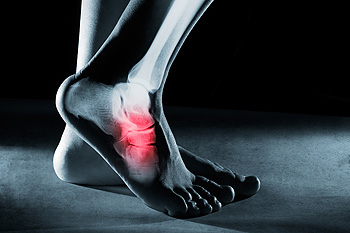Items filtered by date: May 2024
A Rare Genetic Disease and Its Link to Foot Stress Fractures

Hypophosphatasia, or HPP, is a rare genetic disorder characterized by impaired bone mineralization, leading to skeletal abnormalities and increased susceptibility to fractures. While HPP primarily affects bones throughout the body, including the legs and spine, it can also manifest in the feet, causing a range of complications, including stress fractures. In individuals with HPP, the deficiency of alkaline phosphatase enzyme disrupts the normal bone mineralization process, resulting in weakened bones that are prone to fracture under stress or pressure. Foot stress fractures, particularly in the metatarsal bones or heel, can occur due to repetitive impact or weight-bearing activities, exacerbating the existing skeletal fragility associated with HPP. Recognizing the potential connection between HPP and foot stress fractures is critical for an accurate diagnosis and appropriate management strategies. Early intervention, including wearing supportive footwear, orthotic devices, and lifestyle modifications, can help mitigate the risk of fractures and improve the quality of life for individuals living with this rare genetic disease. If you believe you have a foot stress fracture, it is strongly suggested that you consult a podiatrist who can successfully treat these breaks, and determine if HPP is a contributing factor.
Activities where too much pressure is put on the feet can cause stress fractures. To learn more, contact Dr. Mark Gagnon from Advanced Podiatry. Our doctor can provide the care you need to keep your pain free and on your feet.
Dealing with Stress Fractures of the Foot and Ankle
Stress fractures occur in the foot and ankle when muscles in these areas weaken from too much or too little use. The feet and ankles then lose support when walking or running from the impact of the ground. Since there is no protection, the bones receive the full impact of each step. Stress on the feet can cause cracks to form in the bones, thus creating stress fractures.
What Are Stress Fractures?
Stress fractures occur frequently in individuals whose daily activities cause great impact on the feet and ankles. Stress factors are most common among:
- Runners
- People affected with Osteoporosis
- Tennis or basketball players
- Gymnasts
- High impact workouts
Symptoms
Pain from the fractures occur in the area of the fractures and can be constant or intermittent. It will often cause sharp or dull pain with swelling and tenderness. Engaging in any kind of activity which involves high impact will aggravate pain.
If you have any questions please feel free to contact one of our offices located in Crestwood, Orland Park, and Summit, IL . We offer the newest diagnostic and treatment technologies for all your foot and ankle needs.
Reasons Why Your Big Toe Is Numb

Numbness in the big toe can be a perplexing sensation, ranging from a slight tingling to a complete loss of feeling. While big toe numbness might seem like a minor inconvenience at first, it could be a sign of underlying issues that need attention. One of the most common causes is wearing shoes that are too tight. Footwear that constricts the toes can impede circulation and lead to numbness. Conditions that involve stiffness in the joint at the base of the big toe are often accompanied by bone spurs that may press on nerves, causing numbness. Nerve damage, often associated with conditions like diabetes or autoimmune diseases, also can result in numbness, tingling, or pain in the toes. A bunion, which is a bony bump at the base of the big toe can exert pressure on surrounding nerves and lead to numbness. Exposure to freezing temperatures can damage tissues, causing numbness in the toes. Finally, Raynaud’s disease, a vascular condition that results in spasms in small arteries of the feet, can lead to numbness and discoloration in the toes, particularly in response to cold or stress. If you are experiencing persistent numbness in your big toe, it is suggested that you schedule an appointment with a podiatrist for a thorough exam and treatment options based on the results.
Neuropathy
Neuropathy can be a potentially serious condition, especially if it is left undiagnosed. If you have any concerns that you may be experiencing nerve loss in your feet, consult with Dr. Mark Gagnon from Advanced Podiatry. Our doctor will assess your condition and provide you with quality foot and ankle treatment for neuropathy.
What Is Neuropathy?
Neuropathy is a condition that leads to damage to the nerves in the body. Peripheral neuropathy, or neuropathy that affects your peripheral nervous system, usually occurs in the feet. Neuropathy can be triggered by a number of different causes. Such causes include diabetes, infections, cancers, disorders, and toxic substances.
Symptoms of Neuropathy Include:
- Numbness
- Sensation loss
- Prickling and tingling sensations
- Throbbing, freezing, burning pains
- Muscle weakness
Those with diabetes are at serious risk due to being unable to feel an ulcer on their feet. Diabetics usually also suffer from poor blood circulation. This can lead to the wound not healing, infections occurring, and the limb may have to be amputated.
Treatment
To treat neuropathy in the foot, podiatrists will first diagnose the cause of the neuropathy. Figuring out the underlying cause of the neuropathy will allow the podiatrist to prescribe the best treatment, whether it be caused by diabetes, toxic substance exposure, infection, etc. If the nerve has not died, then it’s possible that sensation may be able to return to the foot.
Pain medication may be issued for pain. Electrical nerve stimulation can be used to stimulate nerves. If the neuropathy is caused from pressure on the nerves, then surgery may be necessary.
If you have any questions, please feel free to contact one of our offices located in Crestwood, Orland Park, and Summit, IL . We offer the newest diagnostic and treatment technologies for all your foot care needs.
Fall Prevention Tips to Enhance Workplace Safety

Maintaining a safe work environment is essential in protecting yourself from the risk of falls, which can result in injuries and productivity disruptions. Implementing effective fall prevention measures is vital for ensuring workplace safety. Start by conducting a thorough risk assessment to identify potential hazards, such as wet floors, uneven surfaces, or inadequate lighting. Implementing proper housekeeping practices, including promptly cleaning up spills and removing obstacles from walkways, can significantly reduce the risk of falls. Ask your employer to provide appropriate safety equipment, such as non-slip footwear, harnesses, and guardrails for elevated work areas to further safety. If you have fallen at work and have injured your feet or ankles from working on your feet, it is suggested that you seek expert advice from a podiatrist who can effectively treat these injuries.
Preventing falls among the elderly is very important. If you are older and have fallen or fear that you are prone to falling, consult with Dr. Mark Gagnon from Advanced Podiatry. Our doctor will assess your condition and provide you with quality advice and care.
Every 11 seconds, an elderly American is being treated in an emergency room for a fall related injury. Falls are the leading cause of head and hip injuries for those 65 and older. Due to decreases in strength, balance, senses, and lack of awareness, elderly persons are very susceptible to falling. Thankfully, there are a number of things older persons can do to prevent falls.
How to Prevent Falls
Some effective methods that older persons can do to prevent falls include:
- Enrolling in strength and balance exercise program to increase balance and strength
- Periodically having your sight and hearing checked
- Discuss any medications you have with a doctor to see if it increases the risk of falling
- Clearing the house of falling hazards and installing devices like grab bars and railings
- Utilizing a walker or cane
- Wearing shoes that provide good support and cushioning
- Talking to family members about falling and increasing awareness
Falling can be a traumatic and embarrassing experience for elderly persons; this can make them less willing to leave the house, and less willing to talk to someone about their fears of falling. Doing such things, however, will increase the likelihood of tripping or losing one’s balance. Knowing the causes of falling and how to prevent them is the best way to mitigate the risk of serious injury.
If you have any questions, please feel free to contact one of our offices located in Crestwood, Orland Park, and Summit, IL . We offer the newest diagnostic and treatment technologies for all your foot care needs.
Tingling Toes May Indicate Serious Ailments

Tingling toes may be little more than the result of wearing tight shoes and socks or standing for long periods. But persistent or painful tingling in the toes should not be ignored, as it can signal serious underlying health issues. Among the major concerns is diabetes. High blood sugar levels damage blood vessels and nerves, which can lead to tingling, numbness, and pain in the toes if left untreated. Similarly, autoimmune disorders, such as multiple sclerosis, can disrupt nerve communication, causing tingling sensations, weakness, and numbness, particularly during exercise or rest. Raynaud’s disease, a condition triggered by extreme sensitivity to cold or stress, can lead to tingling or stinging pain in the extremities when exposed to cold temperatures. Deficiencies in essential B vitamins also can contribute to nerve damage and result in tingling, weakness, and numbness in the toes. Various other health issues can cause tingling toes, including stroke, shingles, atherosclerosis. Seizures, underactive thyroid, and certain side effects from medication are other causes. For these reasons, it is suggested that if you have been experiencing persistent tingling in the toes, please schedule an appointment with a podiatrist for a thorough exam.
Toe pain can disrupt your daily activities. If you have any concerns, contact Dr. Mark Gagnon of Advanced Podiatry. Our doctor can provide the care you need to keep you pain-free and on your feet.
What Causes Toe Pain?
Most severe toe pain is caused due to a sports injury, trauma from dropping something heavy on the toe, or bumping into something rigid. Other problems can develop over time for various reasons.
Toe pain can be caused by one or more ailments. The most common include:
- Trauma
- Sports injury
- Wearing shoes that are too tight
- Arthritis
- Gout
- Corns and calluses
- Hammertoe
- Bunions
- Blisters
- Ingrown toenails
- Sprains
- Fractures (broken bones)
- Dislocations
When to See a Podiatrist
- Severe pain
- Persistent pain that lasts more than a week
- Signs of infection
- Continued swelling
- Pain that prevents walking
Diagnosis
In many cases the cause of toe pain is obvious, but in others, a podiatrist may want to use more advanced methods to determine the problem. These can range from simple visual inspections and sensation tests to X-rays and MRI scans. Prior medical history, family medical history, and any recent physical traumatic events will all be taken into consideration for a proper diagnosis.
Treatment
Treatments for toe pain and injuries vary and may include shoe inserts, padding, taping, medicines, injections, and in some cases, surgery. If you believe that you have broken a toe, please see a podiatrist as soon as possible.
If you have any questions please feel free to contact one of our offices located in Crestwood, Orland Park, and Summit, IL . We offer the newest diagnostic tools and technology to treat your foot and ankle needs.

